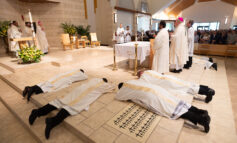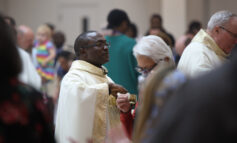By Father John Bayer, O. Cist.
Special to The Texas Catholic
I’ve celebrated several baptisms lately, and I think I’ve realized something beautiful about the sacraments: We come to new life through a mystical embrace, through sacramental contact with the “side” of Jesus.
John the Evangelist testifies to the “blood and water” that flowed from the pierced side of Jesus on the cross (Jn 19:31-37). The Church Fathers interpreted that moment as the inauguration of the Church’s sacraments, which are our mystical access to the Passion of Christ. They also saw this moment as the origin of the Church, who as the Bride of Christ issues from His “side” as He dies for her sake (Eph 5:25-26), much like Eve issues from the side of Adam as he lay sleeping (Gen 2:21-23). Both for Adam and Eve, and for Christ and the Church, the connection to the side communicates an identity of life and love that exists through a distinction of persons and authentic relationship. In other words, through the sacraments, Jesus can say to us, the Church, “bone of my bones and flesh of my flesh” (Gen 2:23). Contact with the side of Jesus — His embrace of us in the sacraments — unites us to Him in a shared life.
I want to enrich this insight by pointing out some parallels between our natural and supernatural lives.
In nature, human beings are given life not merely through the momentous event of birth. As human persons, we live by word and connection, and this is so true that infants who are not held can even die. I’ve read that researchers discovered this when trying to understand infant mortality in certain orphanages. I know a woman who generously volunteers in a hospital and spends hours holding sick infants to calm them and help them fall asleep. Mothers I know often testify to how powerful it is for them to embrace their baby soon after birth, and I can imagine this embrace is powerful also for the baby. Throughout infancy and into the rest of our lives, an embrace communicates in a profound way that we are wanted, protected, and loved. Baptism is similar and yet contains a reverse parallel: While on the natural level the embrace is a proper expression of an acceptance that follows from natural generation, on the supernatural level, the embrace is a gift of grace, or an adoption that grants — rather than presupposes — a share in the divine nature. Like a mother holding her infant to her chest, God holds us to His own side through baptism; but while the embrace of the mother follows upon her recognition of the child as her own, the embrace of God makes us into His own.
Here is another parallel. Our first food, naturally, comes to us from the side of our mother. We each literally lived by the same life source as our own mothers. In a similar way, the Eucharist is not ‘supernatural food’ in a generic sense — it is the very life or supernatural charity that animates Jesus Himself. It is His body “given up” out of love; it is His way-of-living become food, so that we might grow together into a shared life, animated together by a single sap, like branches on a vine. Naturally, a baby does not eat ‘baby food’ but mother’s food; supernaturally, we do not live by anything other than the personal life of God.
Here is one more parallel. One of my most memorable experiences of teaching was a moment of reconciliation with a sixth grader. He was in trouble for pushing someone but initially he didn’t realize just how much trouble he was in. When he saw that I meant business, he broke out in fear and tears and immediately expressed his regret. I was flabbergasted by the response, but I understood immediately how vital our relationships are at every moment. Whatever appears to be happening on the surface, it all seems to pale in comparison to what we are really doing and communicating underneath: embracing each other or refusing to do so, affirming the other as protected and loved, or pushing the other into isolation and indifference. This parallels another way God draws us to His side: the sacrament of reconciliation. Like the father of the prodigal son, God knows how to communicate beneath words (cf. Lk 15:17-22). When the son returns, he tries to speak, but the father seems just to run past all words to make contact in an embrace. The details of our past mistakes can be settled out later (and let’s be honest about how well we can ever know them in this life). What matters is the reality: ‘My son was dead, and he is alive again.’
God wants to hold us close, to give us life from His embrace. Let us be held by Him in the sacraments. And let us embrace each other to share the love that is our supernatural life, all of us branching out from our divine vine.
Father John Bayer, O. Cist., is a monk at the Cistercian Abbey of Our Lady of Dallas in Irving.



